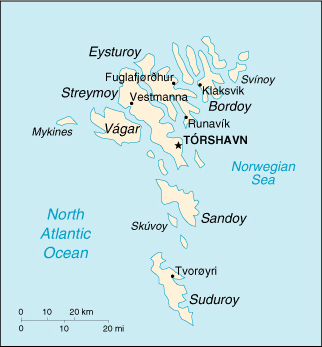
Foroyar
The population of the Faroe Islands is largely descended from Viking settlers who arrived in the 9th century. The islands have been connected politically to Denmark since the 14th century, and a high degree of self-government was attained in 1948.
Faroese are considering proposals for full independence; Denmark dispute with Iceland over the Faroe Islands fisheries median line boundary of 200 NM; Denmark disputes with Iceland, the UK, and Ireland over the Faroe Islands continental shelf boundary outside 200 NM.
Queen Margrethe II of Denmark (since 14 January 1972), represented by High Commissioner Birgit Kleis, chief administrative officer (since 1 November 2001). Prime Minister is Anfinn Kallsberg (since 15 May 1998).
Capital of Faroe Islands is Torshavn, and Olaifest (29 July) is the National holiday.

|
Location: Northern Europe, island group between the Norwegian Sea and the North Atlantic Ocean, about one-half of the way from Iceland to Norway.
The area is approximately 1,399 sq km of land (some lakes and streams). Terrain is rugged and rocky, with some low peaks; cliffs along most of coast. Faroe Islands climate consists of mild winters, and cool summers (usually overcast; foggy, windy).
Population: About 46,345 people live on the Faroe Islands.
Archipelago (sea of many islands) with 17 inhabited islands, one uninhabited island, and a few uninhabited islets; strategically located along important sea lanes in northeastern Atlantic. The precipitous terrain limits habitation to small coastal lowlands. The majority of residents are Faroese (singular and plural). The ethnic group is Scandinavian. Main languages spoken are Faroese (derived from Old Norse), and Danish.
Religious Denomination: Evangelical Lutheran (Main).
Agriculture: Products include milk, potatoes, and vegetables.
Also sheep, salmon, other fish.
Economy: The Faroese economy has had a strong performance since 1994, mostly as a result of increasing fish landings and high and stable export prices.
However, the total dependence on fishing makes the Faroese economy extremely vulnerable, and the present fishing efforts appear in excess of what is required to ensure a sustainable level of fishing in the long term. Oil finds close to the Faroese area give hope for deposits in the immediate Faroese area, which may eventually lay the basis for a more diversified economy and thus less dependence on Denmark and Danish economic assistance.
The Faroese have a standard of living not far below the Danes and other Scandinavians.
Currency: The Danish krone (DKK).

